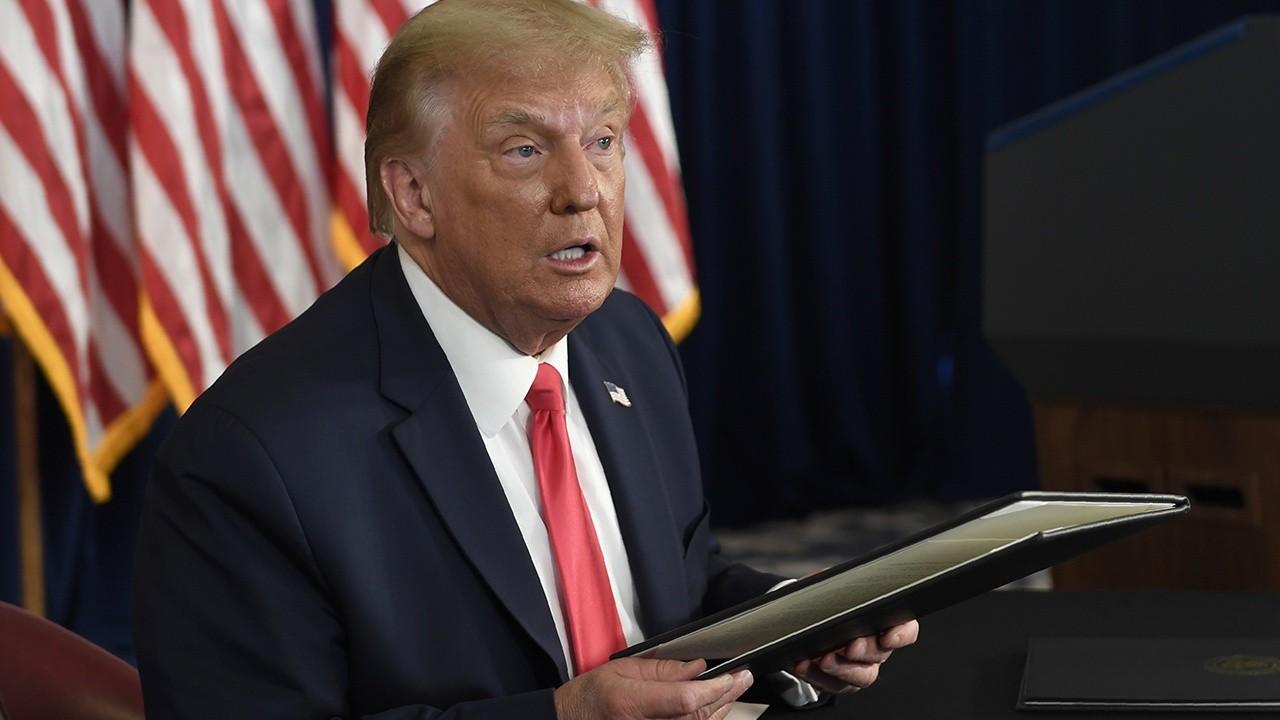$600-a-week unemployment boost lessened pain of coronavirus recession, study shows
The sweetened jobless aid led to 'excess payments of $9 billion by the end of July'
The $600-a-week federal unemployment boost padded Americans' wallet with an extra $9 billion, playing a vital role in lessening the financial pain of the coronavirus-induced economic recession, according to a study published Friday.
The study, published by the Institute of Labor Economics, found the Department of Labor paid out $263 billion in federal unemployment aid — a supplement that began in April after the passage of the $2.2 trillion CARES Act. By comparison, millions of laid-off Americans lost about $254 billion in wages, implying the sweetened jobless aid led to "excess payments of $9 billion by the end of July."
NEARLY HALF OF US JOBS LOST TO CORONAVIRUS COULD BE GONE PERMANENTLY, POLL FINDS
However, that money largely went to workers who were low earners before the crisis began; the bottom third of earners received nearly half — 49% — of the total payments, the findings show.
"It is likely that the additional UI payments served as crucial additional stimulus to aggregate demand during the early months of the Covid-19 recession," wrote the authors of the study, York University economics professor Guido Matias Cortes and University of Illinois economics professor Eliza Forsythe.
That's largely because the pandemic, and subsequent economic shutdown, hit the poorest Americans the hardest. According to Federal Reserve data published in May, about 39% of individuals with a household income below $40,000 reported losing their job in March.
"These payments disproportionately went to low-earning workers, who provide the biggest demand bang-for-the-buck," Forsythe said in a tweet. "Thus, these payments very likely helped mitigate depth of the recession."
The aid lapsed at the end of July amid a high-stakes impasse between White House officials and top Democrats over the next coronavirus stimulus package.
TRUMP'S $400 UNEMPLOYMENT BENEFIT LIKELY JUST $300 FOR MOST AMERICANS
One of the biggest points of contention between the parties is the cost of the proposal.
Democrats have offered to come down $1 trillion from the roughly $3 trillion HEROES Act, which the House passed in May. But the White House and Republican leaders want to keep the price tag closer to $1 trillion amid growing concerns over the nation's ballooning deficit.
"We have said again and again that we are willing to come down, meet them in the middle — that would be $2.2 trillion," House Speaker Nancy Pelosi told reporters last week. "When they're ready to do that, we'll be ready to discuss and negotiate. I did not get that impression on that call."
If the boosted benefits were not available in July, the average workers would have seen their weekly earnings growth fall by 3 percentage points, compared with the increase of 11 percentage points they actually experienced — or roughly $15 billion per week.
When the extra $600 ended, the typical unemployment check returned to an average of $330 per week, a significant benefit cut for individuals collecting the aid. More than 30 million Americans, or roughly one in five workers, are receiving unemployment benefits, according to Labor Department data.
TRUMP'S UNEMPLOYMENT BENEFIT MAY ONLY LAST 3 WEEKS
"These workers, who earned less than $500 a week before the pandemic, are less likely to have savings and other income sources to weather a sustained loss in income," the study said. "Thus, not only was the loss of benefits personally disastrous for many individuals, it also cut off an important source of aggregate demand while the economy remains in the depths of the worst recession since the Great Depression."
President Trump on Aug. 8 signed an executive action to partially replace the benefit at $300-a-week. So far, at least 35 states have been approved to begin delivering the aid.
The boosted aid will last until the money in the fund runs out, or through Dec. 6, 2020, according to the executive memo. The Committee for a Responsible Federal Budget estimates the money will last for about five weeks.
The Labor Department's July jobs report released at the beginning of August showed that employers added 1.8 million jobs last month, sending the unemployment rate down to 10.2%. While it marked the third consecutive month of job growth in the millions, the economy has so far added back less than half -- about 42% -- of the 22 million jobs it lost during the pandemic.
There are roughly 10.6 million more out-of-work Americans than in February.




















